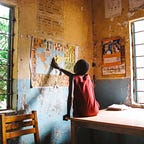An Update from Haiti
It seems that the challenges we face never end. Maybe that’s because MBB chooses to work precisely where serious challenges exist. Women and girls are most at risk in tumultuous places like South Sudan and Haiti. That’s why we’re there.
When Sister Marilyn first decided to expand MBB’s work to Haiti, she never imagined that between South Sudan and Haiti, Haiti would turn out to be the more difficult place in 2019. While the situations in these two countries are vastly different and wildly complex, Haiti is now gripped by widespread violence, causing massive disruptions to schools, hospitals, and basic commerce. Life in places of extreme poverty is always difficult; in Haiti, it has gotten much more precarious.
In July of 2018, our Country Director and our logistician, Samy, were trapped in Port au Prince for several days following the Haitian government’s abrupt increase in gasoline, diesel, and propane prices. Since then, it’s been one miserable setback after another. Things have now reached a boiling point on the western one-third of the island of Hispaniola.
The most recent crisis in Haiti has its roots in corruption by elected officials. Billions of dollars in aid earmarked for infrastructure projects “disappeared”, apparently stolen; recent investigations by third-party entities suggest that the current administration may be responsible. Nationwide protests demanding the resignation of President Jovenel Moise have paralyzed Haiti for weeks. Just yesterday, hundreds of thousands of protesters took to the streets of Port au Prince demanding that Jovenal leave of his own volition. Their offer for the President to leave voluntarily, they warned, is about to expire…
So, how do these protests in the Capital city affect us up in Gros Morne? For starters, they restrict movement throughout the country almost entirely. Vendors whose goods would come to us in the rural areas of Haiti simply can’t travel. Public transportation is now scarce, and where it does exist, can cost 4 times as much as it was just a month ago. Massive shortages of fuel force people to the black market, where a single gallon of petrol sells for up to $20 USD (more than a week’s salary). As a result, food prices have skyrocketed, and the markets of rural Haiti, where not long ago the diverse harvests of Haitian farmers could be bought and sold with ease, are now vacant empty stalls. Would-be buyers shrug in frustration at their inability to restock staples that every household in Haiti needs.
Schools remain closed. “Bay presyon”, or putting the pressure on, is a key tactic of protesters. Disrupting daily operations, they hope, will be enough to force the President to resign. Roadblocks are everywhere — as many as 45 between Port au Prince and the rural town in the northwest of Gros Morne where MBB operates. A bridge in the coastal city of Cabaret, which was already cracking, was effectively destroyed by bandits, forcing the traffic on the main artery of Route National 1 to pass through a riverbed, where these same bandits held up vehicles and robbed passengers of their belongings openly and with abandon. Schools who have dared to open have been met with threats of violence, perhaps the most ominous of which was a message we received in Haiti just this morning that said, “Anyone who sends their children to school must know this. Whatever happens to your children is only your fault. Keep them home.” No words parsed here, for sure…
MBB staff have resorted to traveling between the Capital and Gros Morne by air. Some banks in Gros Morne are already without cash. Soon, even payroll will be difficult to meet given the limited amounts of cash we can access. As fuel supplies dwindle, so too does the supply of safe drinking water, since water must be treated in plants that depend on generators to power their filtration systems. Those generators require diesel which is stuck in ports or tankers with drivers who refuse to take the chance of traveling the roads without a police escort.
MBB does have some good news to share, despite that fact that schools remain closed: the MBB Scholars are dropping by our new Learning Center which opened last month in Gros Morne. In a clear expression of their desire to learn and their thirst for knowledge, 30 visitors per day are coming to the Center. Some use the new internet research stations for homework they were assigned in September. Others come to borrow a books from our new lending library. Some just want to be in a safe place; they distract themselves from the tensions with a game of checkers or a visit with one of our staff members.
We continue to keep a close eye on the situation here and we ask your prayers for the sake of Haiti’s 12 million people, many of whom suffer deeply from the continuing national crisis. We don’t pretend to know the answers. As a foreign nonprofit, we trust the guidance and wise counsel of our friends and our colleagues on the ground in Haiti. We do believe, however, that the answer to these ongoing crises is the inclusion of the voices of women. As you know, where women learn, women matter, and that makes all of the difference.
